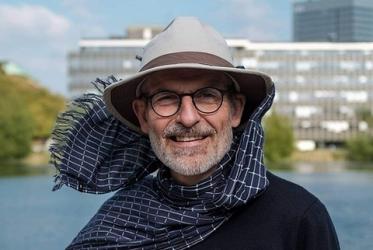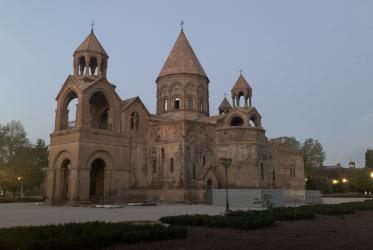Christ’s love moves the world to reconciliation and unity
My personal greetings to all of you attending this regional pre-assembly of the Conference of European Churches. I offer special thanks to Dr Sørensen, Bishop Malicki and Rev. Krieger for organizing your consultation and for inviting me to say a few words.
As acting general secretary of the World Council of Churches, I wish to convey the hopes and prayers of the full fellowship of churches for your deliberations. As a priest of the Orthodox Church of Romania, I feel a special spiritual bond to your mission and ministry and so look forward to the fruits of your labours.
I salute your diligence in thinking through the contribution that you, as European churches, can offer to the worldwide fellowship of churches that will soon gather in Karlruhe for the WCC’s 11th Assembly. The substance and programmatic focus of your meetings promise to illumine the most important topics of the assembly—the shape of our churches as reconciling communities, transformative discipleship, and our role in contemporary society.
Most of all, I honour your courage in together facing the situation and challenges of our times and stepping forth with ideas, commitments and witness to meet the day, advance the cause of reconciliation and unity, and inform the full fellowship of churches in Europe and beyond.
I will not dwell on the challenges we face; God knows they are many and steep. Instead, I wish to remind you of the vital ecumenical contributions that you have already made and still make to the life, well-being, and future of the European churches and all of Europe. The European churches have been so important to the whole ecumenical enterprise and to the development of post-war Europe.
Indeed, your legacy of active engagement in the life of Europe, transcending ethnic, partisan, and nationalistic confines, has been as helpful to the larger society as to the churches themselves.
But what do Europe’s churches have to offer today to Europe’s increasingly secular, pluralistic, and divided landscape? I believe that, in the great European marketplace of ideas and competing interests and loyalties, Christian churches united in fellowship can also contribute a distinctive, even decisive, voice to Europe’s future.
Seeking to align with God’s purposes in the world, you can articulate foundational values that undergird and pertain directly to the public good and are persuasive in Europe’s public sphere: the values of truth, human rights and human dignity, social justice, peace and nonviolence, democratic governance for the common good, and care for the marginalized and for our planet.
I also believe that, paradoxically, as Christians and as churches, the more we unite around a common spiritual paradigm of self-giving love, as exemplified and conveyed in Christ’s love, the more we will be able to speak authentically and convincingly to a pluralistic, searching Europe about the consonant, indispensable values of human dignity, social justice, and the common good.
In this way, praying and witnessing and serving together, you, the churches and religious communities of Europe, can be spiritual beacons that model reconciling community and share inclusive and unconditional love for others—a leaven that lifts the whole of society, a spark that kindles warmth and solidarity, a goad that reminds us of our ultimate purposes and responsibilities to each other and our common home.
In this spirit, I pray that your discussions may prove fruitful for our assembly and for the future of Europe’s churches and society.





